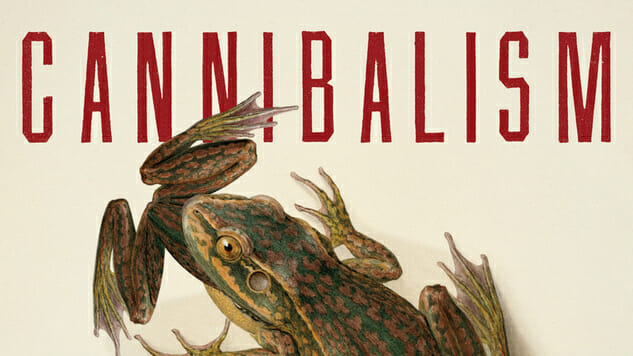Bill Schutt Talks Cannibalism, His New Book Exploring the Taboo Topic

In popular culture, cannibals are monsters who walk among us. But what if cannibalism is less like The Silence of the Lambs and more like Planet Earth? That’s the angle Bill Schutt offers in Cannibalism: A Perfectly Natural History, a text that contextualizes cannibalism in both human culture and animal behavior.
Schutt, a professor of biology at Long Island University Post, has always been drawn to the macabre side of animal behavior. He had a menagerie of weird pets as a child, and he went on to study zoology with a focus on vampire bats. Schutt’s first book, Dark Banquet: Blood and the Curious Lives of Blood-Feeding Creatures, explores vampire bats’ misunderstood world and their fellow bloodsuckers. So it’s little surprise that he chose cannibalism as his next book’s topic
“There had been a lot of sensationalized books about cannibalism,” Schutt says in an interview with Paste. “On the other hand, there were some academic books for specialists, but there really wasn’t anything in the middle that looked at animals and humans.”
Schutt’s new book, which balances scientific jargon with humor and trivia, reveals that the study of cannibalism is relatively new. Much of what we know about cannibalism has been researched since the 1970s, and many assumptions about cannibal creatures are based on randomly documented observations made centuries ago.
“Up until the mid-1970s, the party line among scientists was that—except for a couple of weird examples, like the praying mantis and black widows—if you saw cannibalism in the animal kingdom, it was going to be strange behavior probably related to a lack of alternative food resources or the stresses that come along with captivity,” Schutt says.
Cannibalism in animals is widespread and serves many purposes, including ensuring better odds for offspring survival. Even polar bears, which made headlines in recent years after scientists observed them engaging in cannibalism, have been eating their own species for longer than many people would expect.
 Schutt’s book also reveals that humans have a far more complex relationship with cannibalism than we may expect—or be comfortable reading on the page.
Schutt’s book also reveals that humans have a far more complex relationship with cannibalism than we may expect—or be comfortable reading on the page.
“Looking at humans, I was surprised and interested to see that cannibalism had functions that had nothing to do with criminal cannibalism or cannibalism that was related to standings and sieges or famines,” Schutt says. “I found there was a whole lot more.”
Schutt offers examples like medicinal cannibalism, the practice of eating parts of bodies in order to treat disease, which was common in Europe in recent history. He also traces the taboo of cannibalism from the ancient Greeks through fairy tales and into modernity, showing that equating cannibalism with evil is a cultural construct.
“You have this snowball effect where cannibalism is the worst thing you can do,” Schutt says. “It’s the worst form of vengeance—it’s the thing monsters do.”
The association between cannibalism and monsters catalyzed political actions that shaped the modern world. Schutt’s book examines how conquerors used cannibalism as a means to justify their own violent oppression of populations in North America and the Caribbean. While it is unclear whether or not cannibalism did exist, it was the Western taboo surrounding cannibalism that cast indigenous peoples as barbarians in need of civilizing. Entire populations were eradicated as a result, and the taboo’s influence made it dangerous to engage with cultural traditions viewed as “cannibalism.”
“I fully recognize that there is a lot of grief and horror connected with the behavior in some instances,” Schutt says, “but there are also stories that are less horrific. Culture is king, and we’ve had it dictated to us that we have to bury our dead. Cultures that did not come into contact with the West and didn’t learn that taboo are just as adamant about consuming their dead.”
While Cannibalism is rooted in a naturalistic survey of the topic, the horror is impossible to overlook. Yet Schutt’s lack of sensationalism comes through when writing about the siege of Leningrad, the Donner Party and other cases of survival cannibalism. Combining science and detailed retellings of what took place exposes a central theme of human desperation.
“I certainly don’t believe there’s a cannibalism gene, but I do believe there is a very predictable response to extreme hunger and that happens to be part of it,” Schutt says. “Scientists have taken apart starvation, and this is what happens at the end of that line. When you are completely desperate, you are going to either die or consume a dead body.”
During his interview, Schutt mentioned getting “some flack” for calling cannibalism natural. He insists that he’s not championing cannibalism, but rather revealing its role in nature and as a natural response to specific circumstances, excepting criminal cannibalism. That is the greatest takeaway from the book, which never argues that we as a society need to get over our fear.
By placing human behavior in the context of animal behavior, Schutt explains that culture and nature both play a role in how we think about cannibalism. And through understanding cannibalism’s complex history, humans gain a deeper understanding of their own nature.
“It’s a more accurate way to look at something that we often think is very black and white,” Schutt says. “There’s a lot more complexity there; there’s more of a gray area.”
Bridey Heing is a freelance writer based in Washington, DC. More of her work can be found here.